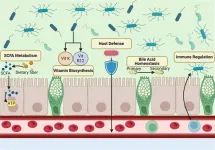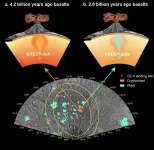(Press-News.org) Researchers at The Hospital for Sick Children (SickKids) have uncovered that stress changes how our brain encodes and retrieves aversive memories, and discovered a promising new way to restore appropriate memory specificity in people with post-traumatic stress disorder (PTSD).
If you stumble during a presentation, you might feel stressed the next time you have to present because your brain associates your next presentation with that one poor and aversive experience. This type of stress is tied to one memory. But stress from traumatic events like violence or generalized anxiety disorder can spread far beyond the original event, known as stress-induced aversive memory generalization, where fireworks or car backfires can trigger seemingly unrelated fearful memories and derail your entire day. In the case of PTSD, it can cause much greater negative consequences.
In a study published in Cell, Drs. Sheena Josselyn and Paul Frankland, Senior Scientists in the Neurosciences & Mental Health program, identify the biological processes behind stress-induced aversive memory generalization and highlight an intervention which could help restore appropriate memory specificity for people with PTSD.
“A little bit of stress is good, it’s what gets you up in the morning when your alarm goes off, but too much stress can be debilitating,” says Josselyn, who holds a Canada Research Chair in Circuit Basis of Memory. “We know that people with PTSD show fearful responses to safe situations or environments, and have found a way to limit this fearful response to specific situations and potentially reduce the harmful effects of PTSD.”
Together with their colleague Dr. Matthew Hill at the University of Calgary Hotchkiss Brain Institute, the research team was able to block endocannabinoid receptors on interneurons, and limit stress-induced aversive memory generalization to the specific, appropriate memory.
Stress-induced memory generalization
In a preclinical model, the research team exposed subjects to an acute, but safe, stress before an aversive event to create a non-specific fearful memory that could be triggered by unrelated safe situations, similar to how PTSD presents in humans.
The team then examined the subject’s memory engrams, which are physical representations of a memory in the brain pioneered by the Josselyn and Frankland labs at SickKids. Usually, engrams are made up of a sparse number of neurons, but the stress-induced memory engrams involved significantly more neurons. These larger engrams produced generalized fearful memories that were retrieved even in safe situations.
When they looked closer at these large engrams, the study found that stress caused an increase in the release of endocannabinoids (endogenous cannabinoids) which disrupted the function of interneurons, whose role is it to constrain the size of the engram.
Memory and the endocannabinoid system
The endocannabinoid system enhances memory formation and helps link lived experiences with specific behavioural outcomes. In the amygdala, the emotional processing centre of the brain, certain ‘gate keeper’ interneurons have special receptors for endocannabinoids, and help constrain the size of the engram and the specificity of the memory. But, when too many endocannabinoids are released, the function of the gatekeeping interneurons is disrupted, causing an increase in the size of the engram.
“Endocannabinoid receptors function like a velvet rope at an exclusive club. When stress induces the release of too many endocannabinoids, the velvet rope falls, causing more generalized aversive fearful memories to form,” explains Josselyn. “By blocking these endocannabinoid receptors just on these specific interneurons, we could essentially prevent one of the most debilitating symptoms of PTSD.”
A surprising link between stress and the developing brain
In 2023, previous research in Science identified larger, more generalized memory engrams in the developing brain than in the adult brain, just like stress-induced memory engrams. As they continue to explore this unexpected link between engram size, stress and age, the teams are also delving into how daily stressors may impact happy memories.
“The many biological functions and processes that make up the complexity of human memory are still being uncovered,” says Frankland, who holds a Canada Research Chair in Cognitive Neurobiology. “We hope that as we better understand human memory, we can inform real-world therapies for those with various psychiatric and other brain disorders throughout their lifespan.”
This research was funded by the Canadian Institutes of Health Research (CIHR), the Natural Sciences and Engineering Research Council of Canada (NSERC), the Dutch Research Council, Niels Stensen Fellowship, ZonMw Memorabel, Alzheimer Nederland, Toronto Cannabis and Cannabinoid Research Consortium and Brain Canada Foundation.
END
How stress is fundamentally changing our memories
2024-11-15
ELSE PRESS RELEASES FROM THIS DATE:
Time in nature benefits children with mental health difficulties: study
2024-11-15
A team of researchers from McGill and Université de Montréal’s Observatoire pour l’éducation et la santé des enfants (OPES, or observatory on children’s health and eduation), led by Sylvana Côté, found that spending two hours a week of class time in a natural environment can reduce emotional distress among 10- to 12-year-olds who had the most significant mental health problems before the program began.
The research comes on the heels of the publication of a UNICEF ...
In vitro model enables study of age-specific responses to COVID mRNA vaccines
2024-11-15
mRNA vaccines saved lives during the COVID-19 pandemic, but older people had less of an immune response to the vaccines than did younger adults. Why? Boston Children’s researchers, led by Byron Brook, PhD, and Ofer Levy, MD, PhD, have found some answers, while providing proof-of-concept of a new system that can model vaccine responses in a dish.
The test system, described in a paper out today in iScience, is called MEMPHIS (Modular Evaluation of immunogenicity using Multi-Platform Human In vitro Systems). It analyzes whole human blood from people of different age groups and applies both proteomics and targeted assays to measure ...
Sitting too long can harm heart health, even for active people
2024-11-15
More time spent sitting, reclining or lying down during the day may increase the risk of cardiovascular disease (CVD) and death, according to a study in JACC, the flagship journal of the American College of Cardiology, and presented at the American Heart Association’s Scientific Sessions 2024. More than roughly 10-and-a-half hours of sedentary behavior per day was significantly linked with future heart failure (HF) and cardiovascular (CV) death, even among people meeting recommended levels of exercise.
“Our findings support cutting back on sedentary time to reduce cardiovascular risk, with 10.6 hours a day marking a potentially key threshold ...
International cancer organizations present collaborative work during oncology event in China
2024-11-15
XI’AN, CHINA [November 15, 2024] — The National Comprehensive Cancer Network® (NCCN®)—an alliance of leading cancer centers in the United States—is taking part in the Fourth International Congress of the Asian Oncology Society and the Chinese Congress on Holistic Integrative Oncology (2024 CCHIO) sponsored by the China Anti-Cancer Association (CACA), Chinese Institute of Development Strategy on Holistic Integrative Medicine, and Asian Oncology Society (AOS). The three-day event highlights international collaborations to improve cancer treatment and outcomes across China and beyond.
“NCCN ...
One or many? Exploring the population groups of the largest animal on Earth
2024-11-15
FROM: James Urton
University of Washington
206-543-2580
jurton@uw.edu
(Note: researcher contact information at the end)
Hunted nearly to extinction during 20th century whaling, the Antarctic blue whale, the world’s largest animal, went from a population size of roughly 200,000 to little more than 300. The most recent estimate in 2004 put Antarctic blue whales at less than 1% of their pre-whaling levels.
But is this population recovering? Is there just one population of Antarctic blue whales, or multiple? Do these questions matter for conservation?
A team led by Zoe Rand, a University of Washington doctoral student, tackles these questions ...
ETRI-F&U Credit Information Co., Ltd., opens a new path for AI-based professional consultation
2024-11-15
A group of South Korean researchers has decided to utilize AI technology to support customer counseling services. Through this, it will provide a significant boost to the performance and efficiency of counselors in various industries, while improving the overall quality of customer counseling services, ultimately making it easier to meet the customers’ needs and expectations while opening up the possibility for realizing new values.
Electronics and Telecommunications Research Institute (ETRI) announced that ...
New evidence links gut microbiome to chronic disease outcomes
2024-11-15
The gut microbiome, an ecosystem of trillions of microorganisms in the human digestive tract, has been increasingly linked to chronic diseases. Research led by Dr. Connor Prosty and his team at McGill University consolidates recent findings that demonstrate a causal role for the gut microbiome in the progression of multiple diseases, ranging from gastrointestinal conditions to immune-related and psychiatric disorders. Published in eGastroenterology, this narrative review examines how manipulating the gut microbiome ...
Family Heart Foundation appoints Dr. Seth Baum as Chairman of the Board of Directors
2024-11-15
Family Heart Foundation Appoints Dr. Seth Baum as Chairman of the Board of Directors
Dr. Seth Baum, Florida Atlantic University, Named Chairman of the Family Heart Foundation’s Board of Directors
The Family Heart Foundation® is proud to announce the appointment of Dr. Seth Baum as the Board of Directors Chairman. An esteemed expert in preventive cardiology and lipidology, Dr. Baum has insights and extensive experience that will contribute to the Foundation’s strategic mission to increase awareness for lay public, expand screening for high-risk populations, improve understanding and education for healthcare teams, and promote ...
New route to ‘quantum spin liquid’ materials discovered for first time
2024-11-15
A new route to materials with complex ‘disordered’ magnetic properties at the quantum level has been produced by scientists for the first time.
The material, based on a framework of ruthenium, fulfils the requirements of the ‘Kitaev quantum spin liquid state’ - an elusive phenomenon that scientists have been trying to understand for decades.
Published in Nature Communications the study, by scientists at the University of Birmingham, offers an important step towards achieving and controlling quantum materials with sought-after new properties that do not follow ...
Chang’e-6 basalts offer insights on lunar farside volcanism
2024-11-15
Basalt samples returned by the Chang’e-6 mission have revealed volcanic events on the lunar farside at 2.8 billion years ago (Ga) and 4.2 Ga, according to research conducted by Prof. LI Qiuli’s lab at the Institute of Geology and Geophysics of the Chinese Academy of Sciences. This work was recently published in Nature.
“Unraveling the volcanic history of the lunar farside is crucial for understanding the hemispheric dichotomy of the Moon,” said Prof. LI.
The asymmetry between the Moon’s nearside and farside—encompassing differences in basalt distribution, topography, crustal thickness, and thorium ...



